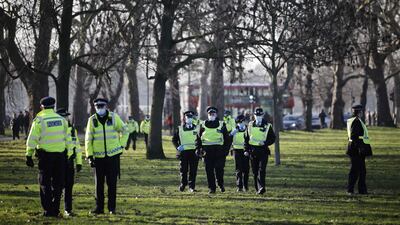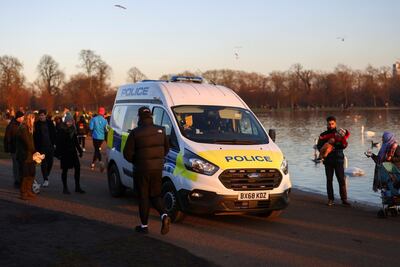Britons are increasingly likely to be fined for breaking lockdown 3 restrictions as police step up enforcement measures to curb a spike in coronavirus cases.
On Wednesday the UK reported 1,564 Covid deaths.
Metropolitan Police Commissioner Cressida Dick said officers would enforce Covid laws “more quickly” as hospitals struggle to cope with rising admissions.
The reality, however, is that stretched police resources mean slapping rule-breakers with a fine is a huge challenge for officers.
When am I allowed to leave my home?
In England, people must not leave their home unless they have a “reasonable excuse”.
For example, for work, a medical appointment, shopping for food or exercise.
Travel in the UK and internationally is also banned unless the traveller is exempt, with government guidance urging people to “reduce the number of journeys you make overall”.
How do police enforce the lockdown rules?
Officers follow a system known as “The Four E's”, which is designed to ensure that the issuing of fines is a last resort.
Before fines are issued, police will:
- Engage with the public to ask why they are breaking the law
- Explain the law, highlighting the risk to public health
- Encourage them to change their behaviour
The last E is for enforcement, when fines will be issued.
However, police chiefs said they would be issuing more fines given the threat to the health system.
Met Police Commissioner Cressida Dick said the move towards stricter enforcement was “common sense”.
What are the fines for breaking coronavirus rules?
In England and Northern Ireland fines start at £200 ($272). The penalty doubles for each repeat offence up to a maximum value of £6,400.
In Wales and Scotland, fines start at £60.
Large parties can be shut down by police - with fines of up to £10,000.
A £10,000 fine can also be imposed on someone for breaking a self-isolation order.
In extreme cases, someone who breaks the rules can be prosecuted and face even greater fines imposed by a court.
Why are lockdown rules getting tougher?
Police have come under extreme pressure to step up enforcement measures because hospitals are at risk of being overwhelmed.
The UK has seen more deaths in the second coronavirus wave so far than during the whole of the first.
The death toll is more than 90,000 - the highest in Europe and the fifth-highest in the world.
More than 35,000 coronavirus patients are currently in hospitals - higher than at any other time in the pandemic.
Prof Chris Whitty, England's chief medical officer, has repeatedly pleaded with people to stay at home as the situation becomes more desperate.
He said the virulent new strain of the virus had “undoubtedly” put more people at risk.
Home Secretary Priti Patel said a minority of rule-breakers were "putting the health of the nation at risk".
"My message today to anyone refusing to do the right thing is simple: if you do not play your part, our selfless police officers – who are out there risking their own lives every day to keep us safe – they will enforce the regulations,” she said.
Can I be fined for not wearing a mask?
Yes. People are required to wear a mask on public transport, in supermarkets and other indoor venues, unless medically exempt.
Police chiefs have said their ability to enforce mask-wearing is limited due to stretched resources.
Recently, a string of major supermarkets – including Tesco, Asda, Waitrose and Morrisons – have said they will ban customers for not wearing a mask.
Borough Market in London on Wednesday became the first outdoor venue to enforce mask-wearing.
Will I be fined for exercising?
Going outside for exercise is one of the exemptions to lockdown restrictions.
However, there has been significant confusion over where people can exercise and for how long.
The law in England states people should exercise “in their local area”. Government guidance defines local as “the village, town, or part of the city where you live”.
Boris Johnson was criticised for riding his bike in Olympic Park, in east London, more than seven miles from Downing Street.
Some police forces have been more strictly applying the “stay local” guidance than others. Derbyshire Police issued fines to two women who drove five miles to a beauty spot for a walk. Police initially accused the women of having an illegal picnic because they were carrying takeaway cups of tea but later retracted the fine.
Can I meet up with people outdoors?
The rules state that people can meet for exercise with one other person from another household outdoors. People should stay two metres apart from each other.
Otherwise, it is illegal to meet up with people socially.
Ministers have become concerned people are using the exemption to meet up with one other person as an excuse to socialise.


